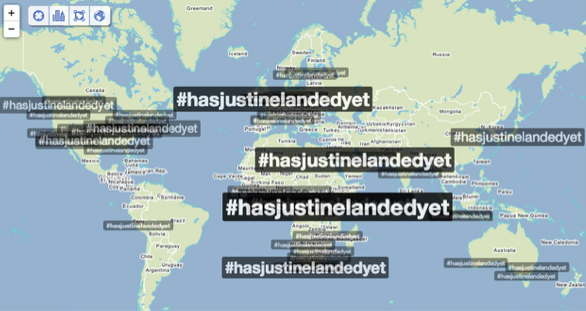While there were several well-known social media blowups over the holidays, the Justine Sacco saga was by far the most infamous. It had all the elements of your typical social media comment gone wrong. For those of you unfamiliar, a communication executive made a really insensitive remark on Twitter which many people found hugely offensive. She was fired, made the usual apologies and deleted all social media presence.
What made this more than a garden-variety faux pas was the unimaginably compressed timeline during which all of this happened. Justine sent her tweet right as she boarded an 11-hour flight without Internet access. By the time she landed, she had unknowingly become a global phenomenon, pushing even trending topic powerhouse Justin Bieber down the list. Globally, people were following events under an impromptu hashtag #HasJustineLandedYet, anticipating how events would play out when she first turned on her smart phone upon landing.

(image from Buzzfeed)
This first caught my attention because I simply love drama as long as it isn’t mine, and this one was chock full of it. It also sounded like another great case study in what not to do, which is always helpful in my line of work. But, the saga itself was soon overshadowed by the superb savvy a non-profit group demonstrated that turned this global attention into a positive.
Justine’s tweet was a tasteless reference to the AIDS crisis in Africa. However, soon after #HasJustineLandedYet spread globally, Aid for Africa (@aidforafrica) jumped into the conversation and encouraged people to donate to their cause. They took it one step further by purchasing the domain name JustineSacco.com and redirecting to a fundraising page. So many people were paying attention at this point, the page reportedly crashed due to volume of donations.

Aid for Africa was able to funnel something already organically happening to make a real impact in a way a planned campaign often can’t quite match. They could do this because they had the elements in place to be ready: someone actively listening to and participating in social media, empowerment to make fast decisions, and the ability to swiftly execute. They also gave the world a needed reminder and perspective—the AIDS crisis in Africa is an ongoing struggle, and someone doing something careless on social media (which, of course, does have its own consequences) pales in importance.
All of this underscores the need for every organization to have strong, clear social media policies, and the willingness to enforce them. Perhaps even more so, it also underscores how well it can work for your organization if you have the tools in place to tastefully tap into an organic phenomenon and find a positive in an otherwise unfortunate situation.
Read a detailed play-by-play here, and an alternate perspective on it here.


